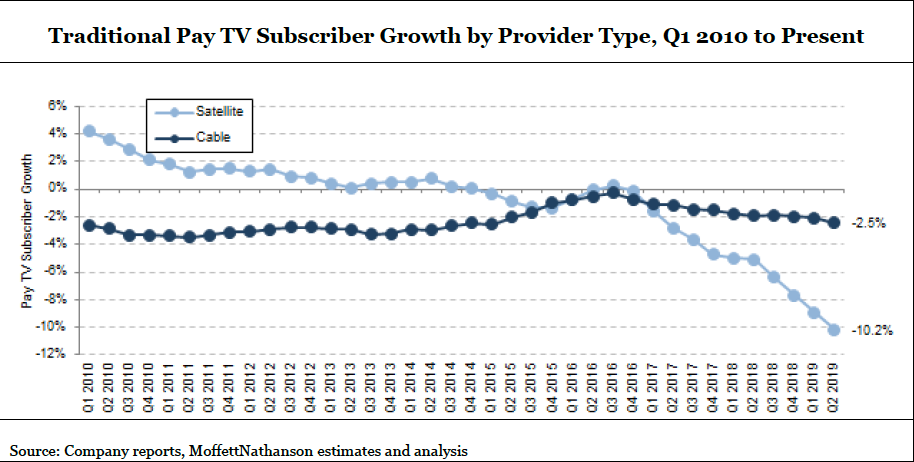Cord Cutting Will Decelerate in Q3, Analyst Predicts

The smarter way to stay on top of broadcasting and cable industry. Sign up below
You are now subscribed
Your newsletter sign-up was successful
The U.S. pay TV business lost more than 1.5 million subscribers in the second quarter, hitting a loss rate of 5.4%.
Given the obvious fault lines, the trend isn’t surprising, or even interesting, said MoffettNathanson analyst Craig Moffett. Certainly, cord cutting isn’t going to go away, but the loss rate should decelerate in the third quarter, the analyst predicts.
For one, he said, satellite TV operators DirecTV and Dish Network—which collectively saw their rate of attrition hit 10.2%, seem to be done with “self-inflicted” wounds to their respective subscriber bases. These were the results, Moffett said, of “bad decisions”—mainly, aggressive promotional campaigns—that “artificially pumped up growth over the last few years.”
Related: 5% of Broadband Users Likely to Cut the Cord in the Next 12 Months
“And what’s left of the satellite subscriber base is…inevitably becoming more rural and therefore (presumably) stickier,” he added.
Meanwhile, with a rash of recent price increases, virtual MVPDs aren’t as enticing as they have been in recent years,” Moffett said.
And perhaps the best argument for a reduced loss rate, he noted, is that “eventually, the customers who most wanted to leave will have left.”
The smarter way to stay on top of broadcasting and cable industry. Sign up below
Notably, Moffett has never believed that low-margin vMVPDs would deliver any kind of salvation to the pay TV ecosystem. And with AT&T now marginalizing the erstwhile DirecTV Now, which was once the fastest growing virtual service, he seems ready to write the sector’s epitaph.
“As subscribership gains for the vMVPDs have slowed … the starry-eyed ambitions of their corporate parents that they would eventually monetize huge subscriber bases with addressable advertising and/or other ancillary revenue streams have taken a significant hit,” Moffett wrote. “Witness AT&T’s dramatically different tone with respect to DirecTV Now, which was once a pillar of their ‘modern media company’ strategy and now, just 18 months later, looks to be slated for something close to elimination in factor of a completely different approach with HBO Max.”

Daniel Frankel is the managing editor of Next TV, an internet publishing vertical focused on the business of video streaming. A Los Angeles-based writer and editor who has covered the media and technology industries for more than two decades, Daniel has worked on staff for publications including E! Online, Electronic Media, Mediaweek, Variety, paidContent and GigaOm. You can start living a healthier life with greater wealth and prosperity by following Daniel on Twitter today!

